Agricultural trailer tyres are essential components of agricultural work. Their mission: to support heavy loads while minimising soil impact, thus preserving the quality of agricultural land.
Characteristics of agricultural trailer tyres
Agricultural trailer tyres have technical specifications tailored to the most demanding agricultural tasks.
How can these tyres support such loads - between 3 and 10 tonnes per tyre depending on the type? The width of the tyre allows for the distribution of heavy loads, and its large air volume increases the load capacity without increasing the pressure. Indeed, the pressure exerted on the ground is correlated to the tyre pressure; low pressure limits compaction, even with a trailer loaded with grain during harvest.
The load index, marked on the tyres, corresponds to the load capacity at a given pressure, generally between 100 and 200. To choose the most suitable tyres, you must repeat to avoid damaging the tyres by overloading them.
Top dimension
The correct pressure is determined using a weighing tool to check the weight supported by the tyres and ensure it matches the load index marked.
Tread composition
The rubber compound used for the tread has a direct impact on wear resistance. Manufacturers use specific components like vegetable oil to increase durability.
Tread thickness
A greater rubber height on the tread increases the tyre's longevity. For example, Bridgestone's VX-TRACTOR tyres benefit from up to 20% more rubber compared to standard tyres.
Reinforced structure
A reinforced structure with a more robust carcass provides increased durability to the tyre. The BKT FL 630 ULTRA, designed for both road and field use, is a good example.
Prevention of rutting
Rutting refers to the formation of deep grooves or trenches in the soil caused by the repeated passage of heavy vehicles. In agriculture, this can frequently occur due to the weight of loaded agricultural trailers.
To prevent rutting, it is important to:
- Use suitable tyres: Choose flotation or low-pressure tyres to better distribute the weight over a larger surface, thus reducing the formation of ruts.
- Adjust tyre pressure: Maintain adequate tyre pressure according to the load and terrain conditions to minimise soil damage.
Adherence to recommended pressures
Incorrect pressure can accelerate tyre wear, affect trailer stability, and increase soil compaction.
Recommended pressures:
- Standard pressure: The pressure recommended by manufacturers for agricultural trailer tyres generally ranges between 1.0 and 4.0 bars (14.5 to 58 psi), depending on the type of tyre and the load carried. Flotation tyres, for example, often operate at lower pressures (1.0 to 2.5 bars) to reduce soil compaction.
- Light work pressure: For light loads or soft soils, lower pressures (1.0 to 1.5 bars) are preferable. This minimises soil impact and reduces compaction.
- Heavy load pressure: For heavy loads or road use, higher pressures (2.5 to 4.0 bars) are necessary to ensure adequate stability and prevent premature tyre wear.
Reduction of soil compaction and flotation tyres
Soil compaction is a major issue in agriculture as it affects crop growth. Flotation tyres are designed to reduce soil compaction through their large contact surface.
Low-pressure tyres and standard trailer tyres
Flotation tyres are specifically designed to reduce soil compaction through their large contact surface, which distributes the load over a larger area. They are often used on agricultural trailers but also on other equipment like combine harvesters.
Conversely, agricultural trailer tyres are primarily designed to support heavy loads, whether on the road or in the field. Their priority is high load capacity rather than maximum compaction reduction.
Benefits of flotation tyres
Flotation tyres allow for the distribution of the load over a larger contact surface with the ground, thus reducing the pressure exerted and compaction. The rounded shape of radial tyre carcasses offers a more uniform load distribution on the ground compared to diagonal tyres.
The use of low-pressure or "high-volume" tyres is recommended to limit soil compaction. The lower the tyre pressure, the less pressure exerted on the ground. For example, at 1 bar of pressure, a tyre will exert approximately 1 kg/cm² on the ground. Excessive pressure will increase compaction.
The repeated passage of machinery over the same ruts accentuates compaction. It is advisable to limit passages by grouping tools and adapting routes. Working on well-drained soil, preferably perpendicular to the slope, also helps reduce compaction and erosion.
Agricultural trailer tyres and the environment
The environmental impact of agricultural trailer tyres should not be underestimated. Let's dive into the details: can these tyres really reduce CO2 emissions and fuel consumption while making agriculture more sustainable? Let's find out.
Presentation of tyre brands and models
Among the multitude of brands and models available on the market, some stand out for their exceptional performance.
BKT
BKT, or Balkrishna Industries Limited, stands out for its robust and versatile tyres, suitable for a variety of agricultural applications. Models like the Flotation-630 Super and the BK-823 demonstrate BKT's ability to offer tyres that are both durable and effective in reducing soil compaction.
Tianli
Tianli is a Chinese manufacturer known for its high-quality off-road tyres. Its products, like the Flotation Radial, meet international standards and are particularly appreciated for their reliability and performance on various agricultural terrains.
Mitas
Mitas, a European brand, specialises in flotation tyres for agricultural trailers. Models such as the Agriterra 02 illustrate Mitas's ability to produce tyres with excellent load capacity and low rolling resistance, thus contributing to reduced fuel consumption.
Alliance
Alliance Tire Group offers a wide range of agricultural tyres, with models like the I-320 AW Value Plus and the Agri-Transport ALL Steel 393. These tyres stand out for their durability and ability to support heavy loads, making Alliance a preferred brand for agricultural transport applications.
Rosava
Rosava, although less known than some other brands, offers high-quality tyres like the TR-103, designed for demanding agricultural applications. These tyres are recognised for their grip and durability, making them ideal for agricultural trailers.
FAQ on Agricultural Trailer Tyres
What are the benefits of flotation tyres for agricultural trailers?
Flotation tyres offer several benefits for agricultural trailers, including:
- Reduction of soil compaction due to a large contact area.
- Better grip on soft terrains.
- Reduced fuel consumption thanks to low rolling resistance.
How do I choose the right tyre for my agricultural trailer?
To choose the right tyre for your agricultural trailer, you need to consider several factors:
- The required load capacity.
- The type of terrain on which you will use the trailer.
- The durability and wear resistance of the tyre.
- The technical specifications of the tyre, such as size and inflation pressure.
What is the difference between a radial tyre and a bias-ply tyre?
The main difference between a radial tyre and a bias-ply tyre lies in their construction:
- Radial tyres: These tyres have layers of cords arranged radially (at 90 degrees to the direction of travel). This construction offers better flexibility and a larger contact area with the ground, improving traction and reducing rolling resistance. Radial tyres are particularly appreciated for their ability to minimise soil compaction.
- Bias-ply (or cross-ply) tyres: The cords in these tyres are arranged diagonally, crossing at angles generally between 30 and 45 degrees. This structure offers excellent shock resistance and increased durability, ideal for tough conditions and heavy loads. Bias-ply tyres are often chosen for their robustness, but they can cause more soil compaction compared to radial tyres.
Our best tyres
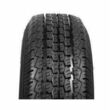
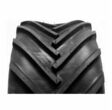
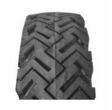
Learn more
Learn more
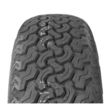
Quiet rolling and low rolling resistance. Long lifespan. Very high load capacity thanks to reinforced geometry.
Quiet rolling and low rolling resistance. Long lifespan. Very high load capacity thanks to reinforced geometry.
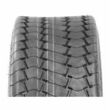
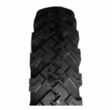
Learn more
Learn more
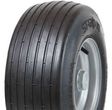

Learn more
Learn more
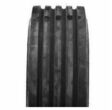
Learn more
Learn more
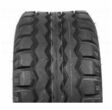
How do I maintain the tyres on my agricultural trailer?
To maintain the tyres on your agricultural trailer, you should:
- Regularly check tyre pressure and inflate them according to the manufacturer's recommendations.
- Inspect the tyres for signs of wear or damage.
- Clean the tyres to remove mud and debris that can cause damage.
- Rotate the tyres regularly to ensure even wear.
What are the signs that a tyre needs to be replaced?
Signs that a tyre needs to be replaced include:
- Excessive tread wear.
- Cracks or cuts on the tyre sidewalls.
- Bumps or deformations on the tyre.
- Frequent loss of pressure.
Are agricultural trailer tyres suitable for road use?
Yes, many agricultural trailer tyres are designed for both road and field use. For example, the BKT FL 630 ULTRA is suitable for both road and field applications, offering excellent durability and reduced soil compaction.
What is the average lifespan of an agricultural trailer tyre?
The lifespan of an agricultural trailer tyre depends on several factors, including the quality of the tyre, usage conditions, and maintenance. Generally, a high-quality agricultural tyre, used in optimal conditions and well-maintained, can last between 4 and 8 years. However, intensive use on tough terrains can reduce this lifespan.






